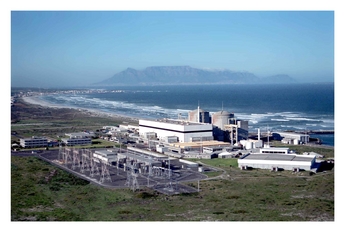South Africa’s Department of Environmental Affairs (DEA) has granted power utility Eskom permission to build a NPP at Duynefontein in the Western Cape, adjacent to the existing Koeberg nuclear plant. The 1830MWe two-unit Koeberg plant generates around 5% of South Africa's electricity.
 Eskom’s preferred site was Thyspunt in the Eastern Cape on the coast between Oyster Bay and St Francis Bay, but DEA said that the overall environmental impacts associated with the Duynefontein site are acceptable and "materially lower" than those for Thyspunt.
Eskom’s preferred site was Thyspunt in the Eastern Cape on the coast between Oyster Bay and St Francis Bay, but DEA said that the overall environmental impacts associated with the Duynefontein site are acceptable and "materially lower" than those for Thyspunt.
Eskom’s Chief Nuclear Officer Dave Nicholls welcomed the decision. “While we had worked on Thyspunt being the preferred site... we have always considered both sites equally capable of hosting a nuclear power plant. To this end, we had progressed the Nuclear Installation Site Licence (NISL) to the National Nuclear Regulator (NNR) for both sites,” he said on 12 October.
Initially, five possible sites were investigated at the scoping phase - Brazil and Schulpfontein in the Northern Cape, Bantamsklip in the Western Cape east of Hermanus, Duynefontein in the Western Cape and Thyspunt. Brazil and Schulpfontein were excluded from further detailed environmental studies.
The current status of South Africa’s nuclear development plans is uncertain. Its Integrated Resource Plan for 2010-2030 calls for construction of 9600MWe of new nuclear capacity to provide 23% of South Africa’s electricity, with the first reactor to come online by 2023. In December 2015 the government designated Eskom to undertake the procurement, and Eskom issued a request for information to companies interested in participating.
However, in April this year, the South African High Court ruled ministerial determinations underpinning the country's nuclear procurement plans were unlawful and unconstitutional. It also declared unlawful intergovernmental nuclear cooperation agreements, including those with Russia, South Korea and the USA, ruling that they and the request for information must now be set aside
Photo: The Koeberg nuclear plant



